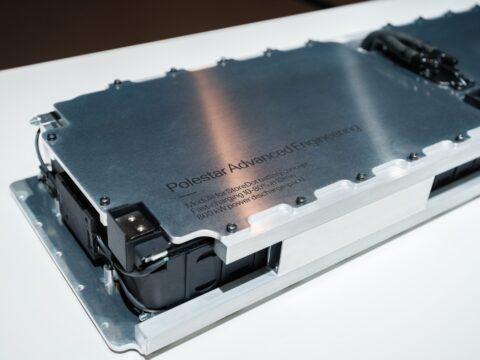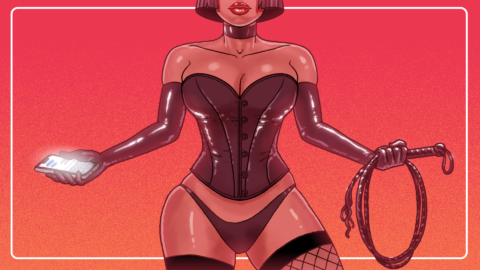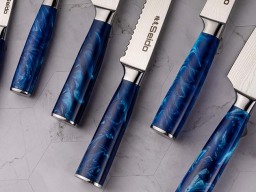A new James Webb Space Telescope discovery means scientists might have to ditch what they previously thought they knew about Milky Way-like galaxies.
NASA snapped a breathtaking view of deep space
NASA used both the James Webb Space Telescope and Hubble Space Telescope to capture a stunning image of the giant galaxy cluster MACS0416.
NASA’s stance on astronaut romance is complicated
NASA is looking into how close-knit bonds between pairs of astronauts, including romantic relationships, could impact crews on long space missions.
Polestar tackles softening EV demand with new tech and next-gen vehicles
Polestar showcased this week its vision for the future: new tech and next-generation vehicles that the Swedish EV company owned by China’s Geely Holdings hopes will spark sales […]
This week in AI: OpenAI plays for keeps with GPTs
Keeping up with an industry as fast-moving as AI is a tall order. So until an AI can do it for you, here’s a handy roundup of recent stories in […]
Singapore-based startup EduFi raises funding for its student loan platform
EduFi, a fintech startup that enables financially strapped students to secure loans for their education, has raised $6.1 million in a pre-seed round led by Zayn VC with […]
OpenAI wants to work with organizations to build new AI training data sets
It’s an open secret that the data sets used to train AI models are deeply flawed. Image corpora tends to be U.S.- and Western-centric, partly because Western images […]
Tech workers turned sex workers: why they changed careers
Sex workers who used to work in the tech industry reveal why they pivoted, and express how they enjoy their new jobs.

As tech workers resist return-to-office mandates, face layoffs that cut into hard-won diversity and equity progress, and watch as their dreams of founding successful startups dry up, it’s safe to say that many might be looking for new professions. Facing sexism and discrimination in the corporate world, and driven by a desire to have a more localized, creative, and empathetic impact, a quiet subset of tech workers left the tech industry to pursue work they’d rather be doing — in the field of sex work.
Whether as erotic filmmakers, professional dominatrixes, or as more traditional escorts, these former tech workers cite a significant increase to their sense of empowerment, job satisfaction, creative license, and overall freedom in their new professions. They share a universal disinterest in returning to tech workplaces — but an underlying confidence that they could, if tech employers one day began to prioritize factors to retain diverse talent. Their stories are inspiring to anyone looking for permission to pursue their true professional aspirations, and also a notice to tech employers, who continue to lose out on the potential of some of their most motivated and capable workers.
Sexism and career stagnation
“I really did experience sexism at every turn in my [corporate] career,” shares NYC-based professional dominatrix, Mistress Serafina. “From my first interviews out of college, I was propositioned by my interviewers, then I was propositioned by the principal engineer at my first job. I was repeatedly looked over for opportunities, and told in my performance reviews that my tone was too fiery.” Serafina recounts her story readily, in hopes that speaking up will remind others who experience discrimination, that they aren’t alone. Her frustration is palpable when she shares the experience of fighting a system where she felt set up to fail.
Serafina’s temperament, which led her to director-level positions in the startup world, despite the uphill fight against sexism, is more openly celebrated now in her new profession. “I learn a lot about myself through the work too; I treat myself as an art project.” says Serafina. “My natural characteristics are appreciated and I have the opportunity to explore myself.” Serafina was a long-time patron of the BDSM world before she began working in it professionally. Her personal experiences and her personality were appreciated in a community of professional dominatrixes, where she apprenticed and refined her skills.
Serafina’s experiences are echoed by sex workers across the field. “I get more genuine respect from men as a sex worker than I ever did in the tech industry,” says Mistress Fae, another software professional turned full-time dominatrix in NYC. Mistress Fae’s tech career ended after several years, after eventually capping out with similar frustration to Serafina’s, where her professional potential felt squandered by an environment of sexism and lack of growth opportunity. “I left the industry after I felt like I’d hit a ceiling and had nothing left that I wanted to accomplish. I was burnt out and frustrated with the short-sighted Silicon Valley tech bubble mindset. No amount of money is worth returning to a field where I felt minimized, degraded, and devalued.”
“I get more genuine respect from men as a sex worker than I ever did in the tech industry.”
A call to do what matters
“I often wonder what it would be like if the big tech companies were run by more individuals who valued creativity,” muses Evana, who requested the use of a pseudonym to protect her identity. Evana is a San Francisco-based escort, whose career took them from the most elite of colleges, to the biggest name companies in Silicon Valley, and eventually to a more content and fulfilling career in sex and intimacy work. “Part of me was just not being nourished [in the tech industry]. My mental health was being drained. I ultimately left for diversity reasons — not just demographic diversity, but diversity in the way people around me thought about the world more expansively.”
“Intimacy is low in this world,” continues Evana. “When I first started sugaring [professionally dating], I was pretty miserable as a software engineer. Intimacy work was immediately more fulfilling — I connected with the fact that people are just so lonely. This is actually important work for our society.”
Evana’s sentiment is shared by the other workers. “I am actually making an individual impact,” says Mistress Serafina. “If I could compare it to what I was doing in tech, it felt like I was working in a completely virtual world — my results were just numbers on a spreadsheet. Now they’re to fulfill people’s fantasies and make an actual impact in a person’s life.” All of these workers value seeing their labor making a real-world impact, and are happy to hop off the corporate ladder and payroll, for the chance at a more expressive and directly impactful profession.
Want more sex and dating stories in your inbox? Sign up for Mashable’s new weekly After Dark newsletter.
Fulfillment and giving back to the community
“I find sex work and just generally the umbrella of erotic creativity — whether it’s filmmaking or writing or sexual spirituality (tantra, philosophies of eroticism), sex education — the whole umbrella has always been intellectually and creatively inspiring to me,” says Val, an erotic filmmaker and sex worker community leader. In addition to their creative projects, Val is passionate about building online communities for sex workers, in a time where sex workers are banned and censored all across digital platforms. “Now that I’m building tech with other sex workers, I’ve learned how powerful it can be to design from the margins — there’s a real rawness, realness; a shamelessness that’s extremely powerful.”
Val and their team are working on challenging norms of the tech industry, that disempower and censor marginalized communities, by using practices shared by sex working communities. Val’s platform, Lips, is pioneering ideas around democratic community ownership of technology, community-based moderation, and decentralization. Their platform is open source and builds its platform culture from the bottom up, with users having most of the say about what happens on the platform. “We have to work together if we’re going to have any chance at making an ecosystem of alternatives. The moderation system we’ve implemented for Lips is modeled after the way the sex work community does vetting, transformative justice, working with people who have been harmed, the way we’re not afraid to express ourselves. There’s so many values I’ve practiced in the erotic economy world that have shaped and informed my work in other domains.”
Val isn’t the only one to combine their background in tech with their new career. Mistress Fae offers free consults and teaches classes/workshops focused on digital privacy, operational security, and technological literacy for other sex workers. Across the board, all of the sex workers talked about the support they receive from their community for the work that they do, and the various ways they all give back into that community for the safety and well-being of other sex workers.
Sex workers aren’t just leaving the tech industry — they’re taking their skills and knowledge to fight back against the oppressive culture promoted by the mainstream tech culture. They’re combining their technical skills and business-savvy with the power-building, community empowering, transparent democracy, and educational practices honed by sex working communities — and they’re more appreciated for it in their new careers. While their pivot may seem unorthodox to some, their clear assuredness that their lives have improved on nearly every professional metric, speaks for itself.
“You know that Venn diagram illustrating the Japanese concept of ikigai?,” asks Fae, referring to the notion of one’s meaning or purpose. “This work is my ikigai — the intersection of what I love, what I’m good at, what I can get paid for, and what the world needs.”
This 10-piece complete Japanese knife gift set is $216
This Japanese knife set is 56% off. Ten knives from Seido will cover all your cooking needs for the holiday season.

TL;DR: As of November 9, get the Seido Tengoku 10-piece knife set for only $215.99 — that’s 56% off.
When you’re cooking up a storm in the kitchen, the tools you use can make all the difference in your culinary life. Whether you’re an average cook or looking to be the next Master Chef, a new set of knives could be a great addition to your kitchen or that of someone in your life who loves to cook. During this holiday season, you’re in luck because this Seido Tengoku 10-piece knife set is now available with a massive slash in its price for a limited time.
These knives are crafted with precision and high-grade materials, featuring a razor-sharp 15° angle blade for a noticeably sharp cutting face. This set features 10 handmade Japanese knives with Damascus-etched blades and ergonomic resin epoxy handles. From the study all-purpose, everyday knife to knives specifically built to cut through the tough stems of leafy greens, this set has everything you need to make food preparation a breeze and clean up even easier.
Wrapped in a beautiful storage box that’s ready for gifting, from Seido, you’ll receive knives for all your slicing, dicing, chopping, and carving needs, including:
-
8-inch chef’s (Gyuto) knife
-
8-inch slicing (Sujihiki) knife
-
8-inch serrated bread knife
-
8-inch Kiritsuke (chef) knife
-
7-inch Nakiri (vegetable) knife
-
7-inch Santoku (all-purpose) knife
-
6-inch boning (fillet) knife
-
5-inch Santoku knife
-
5-inch utility knife
-
3.5-inch paring knife
Celebrate the holidays and impress your guests with ruthlessly sharp knives and elevate your cooking to a whole new level. Or, grab the aspiring culinary master in your life with the knife set of their dreams.
The Seido Tengoku 10-piece Damascus chef knife set is now on sale for only $215.99 (reg. $499).
Prices subject to change.

Opens in a new window
‘Queer Eye’ star Tan France can’t stand tech, TikTok, and mommy bloggers
Tan France of ‘Queer Eye’ and ‘Next In Fashion’ talks about his tech habits, the French tuck, TikTok’s trendy crop-tuck, and why he can’t stand mommy bloggers.

Across the pond, in the quotidien hours of the mid-morning, Brits snack together. They call this phenomenon the “Elevenses” and, in the same way, Gretchen Weiners strived to make “fetch” a part of the American vernacular, Tan France is trying to make “Elevenses” happen here, too.
You know France from his work as a style savant on Queer Eye and competition show Next in Fashion. Now, in partnership with yogurt brand Noosa, he’s working to bring the term from his native Britain into vogue.
“Everyone does Elevenses,” he says over a Zoom call, looking habitually quaffed. “Nobody I know doesn’t do Elevenses. I’ve worked in an office here before, I know that around 10 or 11 people are snacking. It’s just that in America, there’s no word for it.”
We let France try to convince us of the fetch-ness of the “Elevenses,” but not before asking him about his tech habits and take on the latest TikTok fashion trend.
Mashable: Hi, Tan. I apologize for my voice, I’m just getting over a cold.
Tan France: Oh no! OK, then I’m going to be honest. I have the flu. We’re gonna get through this together! I moved three days ago, and I think it’s the exhaustion of how insanely stressful it’s been.
There’s a study that says the top three stressful things in life are divorce, moving…
And death.
You’re a father of two now. Parenting advice is very popular on TikTok, do you ever consult your For You Page for tips?
I’ve used TikTok, but I haven’t used it in quite some time. And I don’t really understand TikTok.
What don’t you understand about it?
Well, I just don’t know how to use it. I’m 40 now, and I’m very tech-averse. So I don’t I don’t know how to use it. I don’t know how to post on it, somebody else does that. I’m an Insta guy.
But no parenting advice on Instagram, either. You know, there’s a mommy blogger crowd.
I’m sorry, I can’t stand them. Because they make me feel crappy about my life thinking, “Why don’t I look gorgeous in my outfit and my kids look amazing?” I can’t do that, I can’t keep up with them. They make me feel crap about my life.
On my Instagram, I usually say how hard it is. I say, “I never look like this, it’s just for this shot.” Mommy bloggers just make me like they’re always living life like that.
You’re not on TikTok, but a device called the “crop tuck” is giving your French tuck method a run for its money.
Oh, I have seen this on Instagram. Yeah, it’s lovely. I think it’s absolutely lovely. I’m sure it’ll work great. It looks wonderful. However, I like the casual-ness of a French tuck.
How does one keep sweaters French-tucked into pants? Mine always pop out.
I don’t know. That’s a really good question because I don’t think it’s ever popped out for me. When you tuck the sweater, do you then pull the sweater out a bit?
Yes.
I don’t know what you’re doing, but I can’t help you.
You said you’re not really into tech at all. Why?
My phone, that’s all I can handle. We don’t have Alexa or whatever all those other things are. Literally no interest whatsoever. Anything techie, I’ve got to turn all that off. I cannot use tech, it drives me insane. Because it always crashes, it’s always complicated. You always have to reboot something, and I don’t know how to reboot something. Boots are the gorgeous heels I’ve got. Other than that, I want to talk about a boot.
You must have a laptop…
I do, but all I know how to do on it is Zoom. I have no idea how to use Excel, I don’t know how to copy and paste anything. That’s what I’ve got an assistant for.
How do you watch Queer Eye and Next in Fashion?
We have a smart TV where all I have to do is press the app and it’s there. I don’t set any of that up. My husband does it and then all I do is press a button. I haven’t even changed a lightbulb. He’s the techie guy, he does all the maintenance that needs doing. I’m like, “I think I know what I offer to our life. You do the other things.”
I’ve heard marriage is all about balance.
That’s it.
My grandfather was a Brit like you and would use one single cup all day for multiple rounds of tea.
That’s most Brits, that’s my family completely. Everyone has a cup. You don’t take that cup. I have my cup at my mum’s house that I’ve had since I was 13. It’s not like you’ve got a set of 10 cups and you just use whichever one. No, you use your cup.
He never mentioned this Elevenses thing to me.
I can’t imagine why somebody would mention Elevenses in England because we just know Elevenses. If you ask a Brit, “Do you know elevenses?” it’s like asking an American what the Super Bowl is. There was once an advert or, sorry, a commercial for this bar — it was a candy bar — but it was this “health” bar that they called Elevenses. They were just using the term that everyone knows.
Typically in England, your Elevenses is one of two things. It’s either a breakfast bar which, again, I just see as candy. It’s full of sugar, and it’s got as many calories.
It’s different than a biscuit?
You’re not having a biscuit for Elevenses, you’re having a biscuit for Tea. But I don’t mean tea. I mean, when we say, “What are you having for Tea” we mean that time between lunch and dinner. I know it’s insane. But at Tea time, we will have tea and biscuits that we dunk into tea.
But for Elevenses, it’s very typically a bar or yogurt because you’ve already had your cereal in the morning or your toast. And it’s too much to have a burger or whatever at 10:30, 11 and so you have something either shockingly sweet, which is this fake health bar, or something more nutritious, and it’s very typical in England to have yogurt.
There’s usually an entire section in a grocery store for your Elevenses yogurt. I’m not just saying it because we’re a part of this campaign, Noosa is my favorite yogurt. All of the flavors are lovely. but that lemon one is so insanely good. Coming in a real hot second is vanilla bean.
In the U.S., we usually think of yogurt as breakfast. What do we have to get past, culturally, to make yogurt our Elevenses snack?
The only hurdle is attaching a name. We’re finding that — and there’s a lot of research — that people are having yogurt in the mid-morning. So all this is to try and encourage Americans to use that name because there are many different names across the world: smak, brekky. But Elevenses is the only one that makes it very clear: It’s 11 o’clock, it’s time for that snack.
And the Brits won’t mind us borrowing, as we always do?
I mean, America has taken all of our great shows. So you may as well take our breakfast snack.









